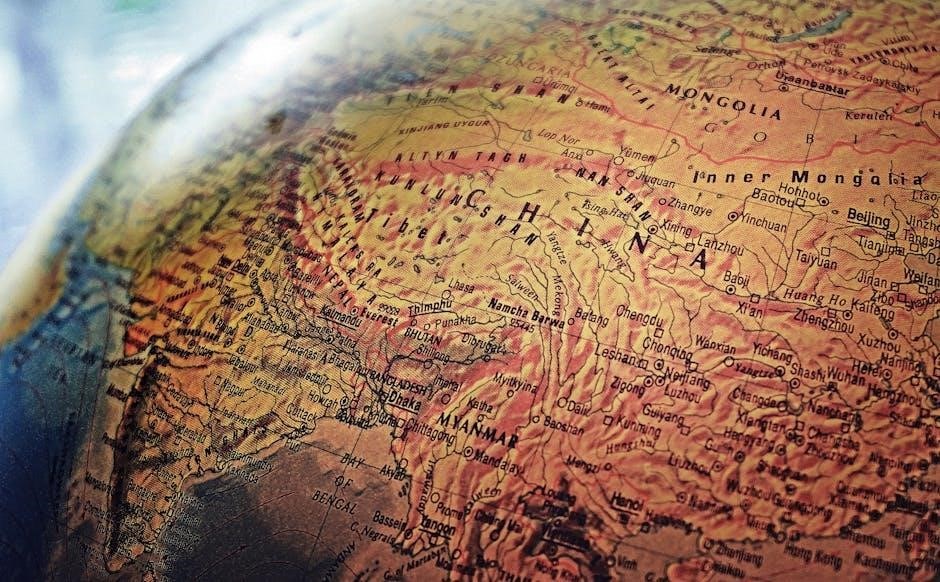Understanding the Key Events of World War I
To understand the key events of World War I‚ it is essential to analyze the historical context and the complex series of events that led to the war. The internet provides a wealth of information on this topic‚ including study guides and online resources. A comprehensive understanding of the key events requires a thorough examination of the political‚ social‚ and economic factors that contributed to the war. By using online resources and study materials‚ individuals can gain a deeper understanding of the war and its significance. The key events of World War I can be broken down into several categories‚ including the assassination of Archduke Franz Ferdinand‚ the invasion of Belgium‚ and the entry of the United States into the war. By examining these events‚ individuals can gain a better understanding of the war and its impact on history. Online study guides and resources are available to help individuals understand the key events of World War I.
Causes of World War I
Causes of World War I include complex factors and events that led to the war using online study guides and historical resources effectively always and properly.
Militarism and Its Impact on the War
Militarism played a significant role in the outbreak of World War I‚ as countries prioritized military strength and aggression. The belief in a strong military capability led to an arms race among European nations‚ increasing tensions and competition. This mindset contributed to the complex system of alliances and the eventual escalation of conflict. Online study guides and historical resources provide insight into the impact of militarism on the war‚ allowing students to understand the underlying causes and events that led to the devastating conflict. By examining the role of militarism‚ students can gain a deeper understanding of the war’s origins and consequences‚ using online resources and study materials effectively to analyze the subject. The study of militarism’s impact on World War I is crucial in understanding the war’s complexities and its lasting effects on international relations and global politics.
Alliances and Their Role in the Outbreak of War
Alliances formed between European nations played a crucial role in the outbreak of World War I‚ as they created a complex system of mutual support and defense. The two main alliances‚ the Triple Entente and the Triple Alliance‚ drew in multiple countries‚ making a small conflict between two nations into a global war. Online study guides and historical resources provide detailed information on the alliances and their role in the war‚ allowing students to understand the events leading up to the conflict. By examining the alliances and their impact‚ students can gain insight into the diplomatic tensions and rivalries that contributed to the war’s outbreak. The study of alliances is essential in understanding the war’s complexities and the delicate balance of power in Europe at the time‚ using online resources and study materials to analyze the subject effectively. Alliances were a key factor in the war’s escalation and outcome.

Key Terms and Concepts
Understanding key terms like militarism and imperialism is essential using online study guides and historical resources effectively always and accurately.
Imperialism and Nationalism as Underlying Causes
Imperialism and nationalism played significant roles as underlying causes of World War I‚ with European countries competing for colonies and resources‚ and nationalist movements emerging in various nations.
The complex system of alliances and the rise of nationalist sentiment contributed to the outbreak of war‚ as countries sought to expand their territories and protect their interests.
Online study guides and historical resources provide valuable insights into these underlying causes‚ helping students understand the complex events surrounding the war.
The intersection of imperialism and nationalism created an environment in which war became increasingly likely‚ as countries prioritized their own interests and sought to assert their dominance over others.
By examining these underlying causes‚ students can gain a deeper understanding of the events leading up to World War I and the ways in which they continue to shape global politics today.
The study of imperialism and nationalism as underlying causes of World War I is essential for understanding the war’s origins and consequences.

Sequence of Events Leading to World War I
European countries competed for wealth and power leading to complex alliances and events unfolding rapidly online study guides provide detailed timelines and explanations always.
European Countries Competing for Wealth and Power
European countries were competing for wealth and power‚ which led to an increase in tensions between them. This competition was driven by a desire to expand their empires and secure new markets and resources. The main European powers‚ including Britain‚ France‚ Germany‚ and Austria-Hungary‚ were all vying for dominance. They were forming alliances and investing heavily in their militaries‚ which further increased the tensions. The competition for wealth and power was also driven by the idea of nationalism‚ which emphasized the importance of a country’s identity and interests. This led to an increase in militarism and aggression‚ as countries sought to assert their power and protect their interests. The European countries were also competing for colonies and resources in other parts of the world‚ which added to the tensions and ultimately contributed to the outbreak of war. Online study guides provide more information.
Major Battles and Events of World War I
Key battles and events occurred during World War I using online study guides and resources effectively always for learning purposes only every day.
Treaty of Versailles and Its Aftermath
The Treaty of Versailles was a peace settlement imposed on Germany after World War I‚ with far-reaching consequences. The treaty imposed harsh penalties‚ including significant territorial losses and heavy reparations‚ which led to widespread resentment among the German people. This resentment is often cited as a contributing factor to the rise of Nazi Germany and the outbreak of World War II. The treaty also established the League of Nations‚ an international organization dedicated to promoting peace and preventing future wars. However‚ the League ultimately failed to prevent the outbreak of World War II‚ and its shortcomings have been widely criticized by historians. The Treaty of Versailles remains a significant and controversial topic in the study of World War I‚ with ongoing debates about its impact and legacy. Online study guides and resources can provide valuable insights into the treaty and its aftermath.

Impact and Consequences of World War I
World War I had significant social and economic consequences affecting global politics and economies greatly always online.
The Great Depression and Its Connection to the War
The Great Depression was a global economic crisis that followed World War I‚ with many historians believing that the war contributed to the economic downturn. The massive debt incurred by countries during the war‚ combined with the destruction of industries and infrastructure‚ led to a decline in international trade and a rise in unemployment. The Treaty of Versailles‚ which imposed harsh penalties on Germany‚ also contributed to the economic instability of the time. The connection between the war and the Great Depression is complex‚ with many factors at play. However‚ it is clear that the war had a significant impact on the global economy‚ leading to widespread poverty and hardship. The study of this period can provide valuable insights into the causes and consequences of economic crises‚ and the importance of international cooperation in preventing such disasters. Economists and historians continue to study this period to understand the complexities of the global economy.

Preparing for a World History Study Guide on World War I
To prepare for a world history study guide on World War I‚ students should start by reviewing the key events and concepts of the war. This includes understanding the causes and consequences of the war‚ as well as the major battles and treaties. Online resources‚ such as study guides and historical documents‚ can provide valuable information and insights. Students should also organize their notes and create a timeline of major events to help them stay on track. Additionally‚ practicing critical thinking and analytical skills can help students to better understand the complex historical context of the war. By taking a systematic and thorough approach to studying World War I‚ students can gain a deeper understanding of this pivotal moment in world history and be well-prepared for assessments and exams. Effective preparation is essential to achieving academic success in this subject area.
